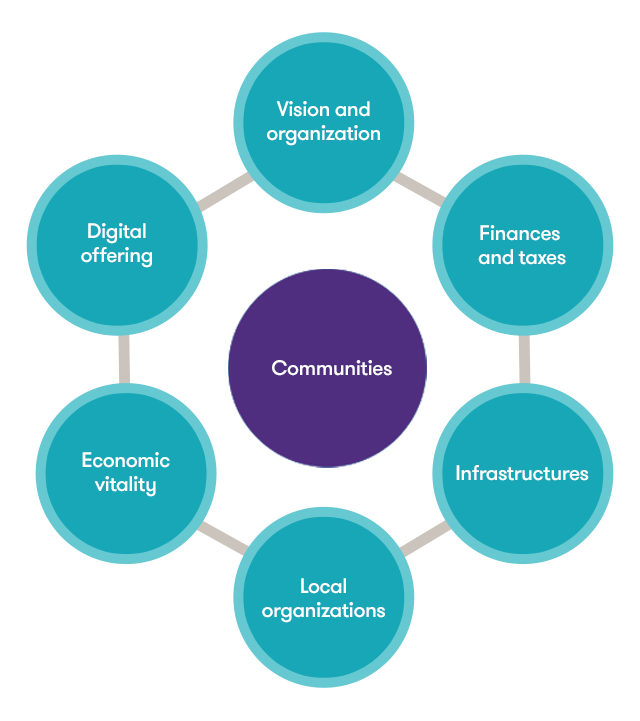Municipalities have long been champions of emergency management. We need only think of the floods in recent years that required considerable effort from many municipalities. They responded promptly and successfully to ensure the protection of citizens and the reconstruction of the affected areas.
However, the COVID-19 pandemic is unlike anything we have ever experienced. First and foremost, this is a health and economic crisis. Not only do municipalities have to go into emergency operating mode to maintain and transform services to citizens, their own operations are significantly impacted.
Once the crisis is over, the recovery of our communities will be a priority. Municipalities will be at the forefront of this recovery and will have to reassess a number of aspects:
Vision and organization
During a crisis, the focus is on immediate, short-term measures. The recovery will require that the focus be re-adjusted to ensure that elected officials continue to have a long-term vision at the heart of their actions. In addition, these profound changes will require a fundamental transformation of management and human resource practices within the municipality.
Finances and taxes
New financial management strategies will need to be developed. Some municipalities may be in a deficit situation in 2020 due to reduced revenues, deferred property tax payments, lower property transfer fees as well as a slow down in additional invoicing and revenues from user-paid leisure and cultural activities. Additionally, it will be difficult to justify a tax increase in 2021, when most citizens will have been financially impacted.

Infrastructures
The federal government has already announced investments to foster economic recovery. Municipal infrastructure investment planning must be started quickly in order to take advantage of the infrastructure plans that the governments of Quebec and Canada will put in place.
Local organizations
There are numerous local sports, leisure, cultural and community organizations and it can be expected that there will be significant requests for support. Ensuring that these requests are managed equitably during this period of considerable need, while maintaining community mobilization will be critical. The goal will be to ensure that the service offering to citizens is maintained, and even improved!
Economic vitality
Economic development will be paramount and at the heart of recovery. Since the adoption of Bill 122, municipalities can take a leadership role in this respect as a result of the Quebec government transferring management of the $150 million Fonds local d’investissement to them. Cities will also need to quickly establish strategies to revitalize commercial arteries and be proactive in the global local purchasing movement.
Digital offering
In recent years, there has been a lot of talk about smart cities. A majority of municipalities have implemented some measures. However, social distancing and the need to isolate have shown that continuing to provide services will depend on the digital transformation of working arrangements and the supply of services to citizens. For example, conducting virtual public consultations could become a way to stay in touch with your citizens. However, this will require that information security be reviewed to counter the constant increase in fraud and cyber attacks and safeguard the integrity of your citizens’ and third parties’ data.
The recovery will therefore be the greatest challenge of the 21st century and will affect all aspects of municipal life. It will require planning, sound management and a great deal of openness, innovation and flexibility to adapt to a world that, we hope, will be better for our communities.
17 Apr 2020 | Written by :
You could also like to read
Next article
The novel coronavirus (COVID-19) pandemic is spreading around the globe rapidly. The virus has taken its toll on not just human life but businesses and financial markets too, the extent of which is currently indeterminate.
Entities need to carefully consider the accounting implications of this situation. The Grant Thornton International Ltd. IFRS team has published two documents on the impacts of the COVID-19 pandemic on the financial reporting under IFRS:
- COVID-19: Financial Reporting and Disclosures;
- Reporting the impact of COVID-19 on your business.
The publication COVID-19: Financial Reporting and Disclosures identifies key financial reporting areas that entities need to consider when determining the impact on their business and, on the results, financial position and disclosures in their financial statements prepared in accordance with IFRS. This is not an exhaustive list and there may be other areas not included in this publication that entities should consider. The areas are not listed in order of importance.
The document Reporting the impact of COVID-19 on your business sets out ten questions CFOs should ask themselves to ensure that the financial statements not yet issued present fairly the financial position, financial performance and cash flows of the entity. This is not an exhaustive list. The questions are not listed in any order of priority, because their applicability will depend on facts and circumstances.
Consult all the documents in the pdf below.
Next article
More than ever, organizations need strong leadership to guide their teams through the storm caused by COVID-19.
Seasoned managers aren’t supposed to let tough situations throw them off. After all, experience has taught them to deal with everything from predictable hiccups to unforeseen emergencies. But the current crisis has taken stress levels to new heights and the added pressure is having an unprecedented impact on all aspects of business management, including finance, technology and human resources.
Leaders have to act fast to protect their employees and the company. This involves making hard decisions and constantly adjusting (and readjusting) to ever-changing circumstances. In the current context, effective leaders need to have a comprehensive management toolkit at their disposal, as well as the wisdom to know which tools to use and when.
What management style works best in uncertain times?
When a crisis occurs, it can be hard to know what management approach to take. Should you assume full control and reduce staff members’ decision-making authority? Or is this an opportunity to promote self-reliance and initiative?
It depends. The best approach is to adapt your management style to each team member’s personal needs and professional maturity. Some people require clear directives while others will rise to the occasion if you give them a certain amount of freedom.
Either way, in a climate of urgency, it’s important for managers to have a clear vision of the situation and objectives to engage employees. You’ll need to put all your technical skills and interpersonal savvy to inspire confidence.
Focus on your targets
Since this is no time to add to employee stress or confusion, managers should keep their eye on the finish line and base all their decisions on their primary objective.
Short-, medium- and long-term considerations should be taken into account. The longer the crisis lasts, the harder it will be for employees to stay on task and remain productive. In anticipation of waning motivation, managers should think of ways to boost employee engagement.
Keeping busy can help people feel like they’re still in control, which is useful for managing anxiety. That’s why managers should clearly define each person’s role and assign them tasks that they can realistically achieve in the current circumstances.
Delegate and empower
When pressure runs high—like during a crisis—pessimism can set in. To prevent that from happening, delegate certain responsibilities to team members. When individuals are actively involved in finding solutions and establishing priority actions, they’re more likely to feel optimistic. Give employees the opportunity to take initiative and step up their responsibilities, as long as they’re ready for it.
Take time for a heart-to-heart
As a leader, you benefit from working closely with your team members. Help them understand what things they can control, what factors they can influence, and what issues are entirely out of their hands. Laying it all out and setting priorities can do a lot to ease anxiety.
In this way, you will focus employees’ energy on useful and value-added actions. This is what’s known as situational leadership. It involves knowing how to be most effective in a given situation.
Ultimately, these carefully measured interactions can help you establish trust with team members while maintaining enough distance to have a big-picture appreciation of the issues that they can’t see from their vantage point.
Enlist the team’s help to find solutions
A good leader encourages others to voice their opinions and observations, without allowing any finger pointing or blame games. Instead, try to harness each team member’s personal strengths and see how they can contribute to shared objectives.
In addition to being good communicators, strong leaders need to be great listeners. By hearing what each person has to say and being open-minded, you’ll be better able to act as the glue that holds the team together and help each individual find a sense of purpose and accomplishment, despite the crisis.
Remember to be lenient with yourself and your employees. As the person setting the example for the team, feel free to let them see that no one is perfect. Your team is counting on you to analyze the situation, make decisions—including tough choices—and adjust plans and priorities as needed. You’re allowed to make mistakes. But you need to be open to feedback and ready to make quick changes to keep everyone moving in the right direction.
08 Apr 2020 | Written by :
Jean-François Boudreault is a RH expert at Raymond Chabot Grant Thornton.
See the profileNext article
The spread of COVID-19 is disrupting businesses around the globe. As the crisis continues, businesses need to be agile in managing the tax effects on their business.
While tax filings and payments may already be front of mind, other international tax areas require consideration.
Multiple sectors have been impacted with some businesses completely side-lined due to widespread labour and supply chain interruptions. The credit markets are only beginning to see the effects of cash strained borrowers struggling to meet their obligations. Consumer demand has all but evaporated as countries continue to encourage limited interaction to control the spread of the virus. Unemployment is sharply increasing in many places with governments stepping in, and in some cases guaranteeing incomes.
Multinationals are especially challenged with a complex web of legal and administrative changes happening around the globe. Operating in what was already a complex environment, businesses are now trying to do more with less as the public health situation weighs on the economy. As the crisis continues, businesses need to be agile in managing the tax effects on their business. We have highlighted a few of the areas below that businesses may look to address as they look to be resilient amid the global disruption.
If any of these areas have raised concerns, or you would like to discuss in more detail for your business, please contact our experts.
07 Apr 2020 | Written by :











